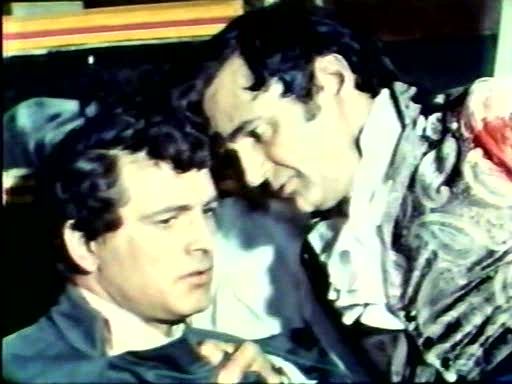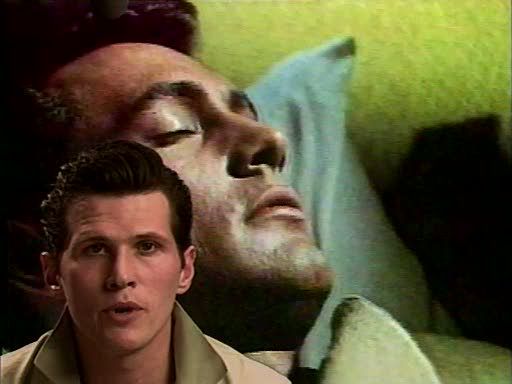
In Rock Hudson's Home Movies, filmmaker Mark Rappaport conducts a revisionist analysis of the famed Hollywood actor's cinematic career, with Hudson's films revisited with the hindsight knowledge that he was gay and would eventually die of AIDS. It's an essay-film that consists almost entirely of clips from Hudson's films, crudely recorded with videos, often from TV, giving them a raw, overexposed, desaturated appearance. This strips aesthetics out of the equation, shifting the focus entirely onto the dialogue, the situations, and the unspoken subtext underlying Hudson's screen persona. The film is, by turns, fascinating, provocative, amusing, and very often deeply silly and misguided, as Rappaport's quest to read gay subtext into seemingly everything Hudson did onscreen yields both clever insights and obvious stretching.
The film is on its strongest ground in the examination of the Doris Day/Rock Hudson comedies of the late 50s and 60s, films like Pillow Talk and Lover Come Back, where the plot would often center around Hudson assuming dual identities, one a sexually voracious macho man and the other a prancing wimp. Obviously, Rappaport finds these films rich in subtext about questions of gay identity, and it's not hard to see why. By deftly editing together scenes and chopping up the dialogue, he even manages to suggest that the "gay" onscreen Hudson found himself admiring the more "macho" Hudson. These films, under Rappaport's dissection, seem to toy with Hudson's sexuality, creating densely layered meta-situations where, as Rappaport's onscreen narrator Eric Farr points out, a gay man passing for straight is asked to play a straight man who pretends to be gay. It creates a twisted, hall of mirrors situation that the film compares to the funhouse conclusion of Welles' The Lady From Shanghai, with Hudson essentially having an onscreen affair with himself — or at least finding himself in situations where Doris Day suspects him of it.
Though Rappaport makes some interesting points along these lines, the film is continually mired down in the filmmaker's insistence on finding gay subtext everywhere he looks. At times, it's blatantly obvious that he's taking lines out of context even when one doesn't know the original films he's referencing. Two cowboys staring each other down for a shootout becomes gay cruising for Rappaport. Hudson's interrogation of his nervous son-in-law in Giant: likewise. Even the pronouncement that "Hamburg is the gayest city in Germany" gets edited into the film as though it's more evidence of Rappaport's thesis, even though he later somewhat sheepishly has to admit that the more innocent usage of the word was still the dominant one at the time of these films. Nothing escapes Rappaport's revisionism. When, in what is obviously a clip from early in Hudson's career, a man in a skeleton mask and black cloak bursts into the room as Hudson kisses a girl, Rappaport takes it as foreshadowing of the actor's eventual death from a sexually transmitted disease. It would be laughable if moments like this weren't in such outrageously poor taste, and of such dubious value as a form of film analysis. It's bad enough when Rappaport tries to read psychology into the characters Hudson played onscreen, characters who Hudson himself had no real hand in creating. Much worse are the moments when the film treats Hudson's cinematic legacy as a prediction of his eventual death, as though that revealed anything beyond Rappaport's own morbid fascinations.
In fact, much of what Rappaport reads in terms of gay subtext could be much more persuasively explained as more general expressions of sexual morality in the movies. One of the film's most tightly edited montages is a selection of Hudson's onscreen kisses with his leading ladies, and Rappaport points out that nearly every one is interrupted in some way, cut off by one partner or the other or else disrupted by some intrusion. For Rappaport, this is confirmation of Hudson's homosexuality written into his films — how, who knows, since as the narrator acknowledges, Hudson had nothing to do with any of the actual content of his movies. These kisses suggest a discomfort with heterosexuality, a perfunctory stab at playing an expected role by a man who must hide his true self. At least for Rappaport they do.
But such tropes are to be found everywhere in the cinema, particularly in the classic Hollywood era, and they're hardly restricted to gay actors. What Rappaport goofily calls "kisses interruptus" have always been a common device for both comedies and dramas — in the former, the break-off of the passionate moment is played for humor, while indecision about romance, characterized by moments of giving into passion and moments of regret, has always been a central theme in melodramatic works. One can easily imagine a montage of similar incomplete kisses with completely straight actors: it's such a common narrative element that reading it as having anything to say about Hudson's homosexuality is ludicrous. Rappaport is so intent on seeing gay meaning in everything that he often seems blind to alternative possibilities, to other readings, simply forcing everything to fit into his reductive schema. Many of the continuities he detects could be explored in terms of genre, or along auteurist lines, or as storytelling clichés, but Rappaport isn't interested in broader criticism, only in proving his pet theories.

In analyzing Howard Hawks' Man's Favorite Sport?, Rappaport emphasizes how Hudson's character is continually humiliated for not being a manly man, for not knowing "how to fish," which is an obvious euphemism for being sexually inexperienced — and, Rappaport believes, also a euphemism for Hudson's sexuality. In some ways, he's got a point, as there's a thin line between making a film about a man who's sexually inexperienced and one about a man who's simply sexually inexperienced with women. But Rappaport goes further, suggesting that Hawks (no stranger to homoerotic subtexts) and his screenwriters, like many others in Hollywood, had it in for Hudson, that they were purposefully mocking his sexuality in this film and others like it. This thesis quickly gets tied up in knots trying to justify itself when dealing with the question of Hawks' comparable films with Cary Grant, many of them comedies of humiliation like I Was a Male War Bride and Bringing Up Baby. The latter is cited for Grant's famous "I just went gay" exclamation, while the former becomes a prime example of how Grant, when cast in these films, somehow avoided being too humiliated or debased, while Hudson (who was literally replacing Grant in Man's Favorite Sport?, a film originally intended for the older man) looks like "a sissy."
Rappaport asserts, somewhat lamely, that Grant, despite persistent rumors about his own sexuality, came off better because he was married multiple times, while Hudson only married once. It's a weak justification, and in fact Hudson's character comes off no more ineffectual in his Hawks appearance than Grant did in most of his comedies with the director — except in the sense that Grant was a far better comedic actor. Rappaport seems blind to (or indifferent to) the continuities between these films and others not starring Hudson. Instead, looking at Hudson's oeuvre in isolation, he treats it as though the actor had any control over the lines he said and things he did, as though there were not more important considerations affecting these films than the sexuality of the actors, and as though the threads he identifies here as gay subtexts were not running through all sorts of unrelated movies regardless of the sexuality of individual stars.
The film is further dragged down by the amateurish, stilted performance of Eric Farr, supposedly playing Hudson speaking from beyond the grave, narrating his own life story through the movies he starred in. Farr's awkward line readings only distract from any point Rappaport's trying to make, as does the whole conceit of a younger version of Hudson supposedly speaking in the first person about his sexuality like this. Farr seems to be there primarily because he's handsome, not that he actually looks anything like Hudson or has any actual acting talent. In any event, Farr, though distracting, winds up being the least of the film's problems. Rappaport ultimately buries his most interesting points about gay identity and gay cinematic representation beneath a smug insistence on seeing every onscreen male friendship as a latent gay relationship. The film often adopts an insufferable wink-wink tone not far from adolescent toilet humor, delighting in the discovery of "naughty" interpretations for everything from two soldiers discussing traumatic wartime experiences to a deadbeat father reuniting with his son. Worse, there's a kind of barely restrained contempt for women flowing through this film's own subtext. Rappaport's text frequently treats the women in Hudson's movies as empty-headed predators, and cruelly gives Cyd Charisse the introduction that "she had seen better days," calling her "Ms. Dracula on a talent search" when she snares Hudson for a passionate kiss. It's this kind of catty commentary, along with the film's obliviousness to anything beyond its narrow interpretative rubric, that prevents Rock Hudson's Home Movies from being the truly incisive Godardian essay it aspires to be.








0Awesome Comments!